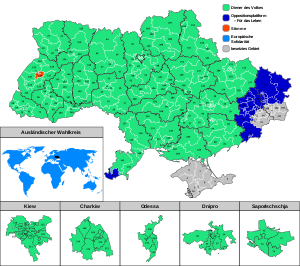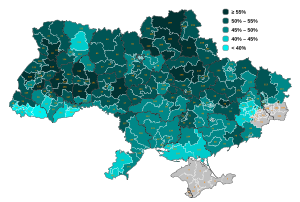Parliamentary election in Ukraine 2019
The 2019 parliamentary elections in Ukraine took place on July 21, 2019.
Due to the annexation of Crimea by Russia in March 2014 and the occupation of parts of the Donetsk and Luhansk oblasts by separatists , currently only 424 seats in the Verkhovna Rada can be elected and around 12 percent of the citizens entitled to vote cannot participate in the elections. Under current electoral law, 225 members of the Verkhovna Rada are elected through a nationwide proportional representation system with a 5% clause, and the remaining 199 seats are elected in constituencies with a relative majority voting system.
background
After the parliamentary elections in 2014, the Bloc Petro Poroshenko (BPP) party became the largest party with 132 seats. On November 21, 2014, the BPP, the Popular Front , Self-Help , Fatherland and the Radical Party signed a coalition agreement. Arseniy Yatsenyuk became Prime Minister on December 2, 2014.
The Radical Party left the coalition on September 1, 2015 in protest against a vote in parliament that changed the Ukrainian constitution. They feared greater powers for separatists in their areas due to the decentralization resulting from the constitutional amendment. In February 2016, Economy Minister Aivaras Abromavičius announced his resignation, alleging that the government had no real commitment to fighting corruption. As a result, on February 17 and 18, 2016, the Fatherland and Self-Help parties left the coalition. The remaining coalition was thus missing five MPs for a majority of 226 MPs in parliament. On April 14, 2016, Volodymyr Hroysman became the new Prime Minister of Ukraine and the Hroysman cabinet started work.
Since the newly elected President of Ukraine Volodymyr Selenskyj in the 2019 presidential election in Ukraine did not have his own party in the Ukrainian parliament, he prematurely dissolved the Verkhovna Rada on May 21, 2019, one day after his inauguration. After the president had issued a decree bringing forward the parliamentary elections originally scheduled for the end of October 2019, a lawsuit was filed with the Constitutional Court to declare it unconstitutional and to prevent the early election. On June 20, 2019, the decree was declared legal by the court and the election could take place on July 21, 2019.
Survey
Polls predicted that the newly formed Sluha narodu (in English Servant of the People ) party of Ukraine's President Volodymyr Zelenskyi, who was elected in April 2019 , would win the election. Another newly founded party, which was believed to have a high share of the vote and which was considered a possible coalition partner of the Selenskyjs party, was the voice party (Ukrainian Голос Holos ) of the Ukrainian rock musician Svyatoslaw Wakarchuk .
Result
The party of the Ukrainian President Sluha Narodu was able to win an absolute majority of seats in the new Verkhovna Rada with around 43% of the votes cast and 130 direct seats. Thus, Sluha narodu , as the first party in the independent Ukraine at all, can form a government without the participation of other parties. A total of five parties overcame the 5% hurdle . Although all the relevant fascist and neo-Nazi parties had united, their share sank by 4.3 percent or shrank from just over a million votes to just 315,530 votes.
The voter turnout was below 50%, the lowest in a Ukrainian parliamentary election. The first session of the newly elected parliament took place on August 29, 2019.
| Distribution of seats in the Verkhovna Rada | ||||||
|---|---|---|---|---|---|---|
| Political party | percent | Mandates according to party list |
Direct mandates | All in all | ||
| SN | 43.16 | 124 | 130 | 254 | ||
| OP | 13.05 | 37 | 6th | 43 | ||
| AVV | 8.18 | 24 | 2 | 26th | ||
| IT | 8.10 | 23 | 2 | 25th | ||
| ST | 5.82 | 17th | 3 | 20th | ||
| other parties independent |
- | - | 56 | 56 | ||
| Source: | ||||||
Individual evidence
- ^ Elections of People's Deputies of Ukraine 2019 on the official website of the Central Electoral Commission of Ukraine ; accessed on July 26, 2019 at 6:04 p.m. (Ukrainian)
- ^ Elections to the Verkhovna Rada 2019 on nv.ua ; accessed on July 22, 2019 (Ukrainian)
- ^ Result of the parliamentary elections in the Ukrainian Pravda; accessed on July 22, 2019 (Ukrainian)
- ↑ The candidates for Kharkiv 174, Luhansk 107, 112 and 114 are listed under "self-nomination" because their party did not draw up a list.
- ↑ 165
- ↑ For Transcarpathia 69
- ^ For Lviv 123, Volyn 22 and 23
- ↑ orf.at: Ukraine will probably elect a new parliament on July 21st . Article dated May 21, 2019, accessed May 21, 2019.
- ↑ Paul D'Anieri: Gerrymandering Ukraine? Electoral Consequences of Occupation. Sage Journals, August 9, 2016, accessed August 9, 2016 .
- ^ Parliament passes law on parliamentary elections. Kyiv Post, November 17, 2011, accessed August 9, 2015 .
-
^ Five political forces sign coalition agreement. Interfax-Ukraine, November 21, 2014, accessed November 21, 2014 . Ukraine's parliamentary parties initial coalition agreement. Interfax-Ukraine, November 21, 2014, accessed November 21, 2014 .
- ↑ Ukraine Radical Party Quits Ruling Coalition After Deadly Clash. Bloomberg News, September 1, 2015, accessed September 1, 2015 .
- ↑ Ukraine Economy Minister decides to resign. Ukrainian Independent Information Agency (UNIAN), February 3, 2016, accessed February 3, 2016 .
-
^ Samopomich pulls out from ruling coalition in parliament. Interfax-Ukraine, February 18, 2016, accessed February 18, 2016 . "Self" comes from the coalition. Ukrayinska Pravda, February 18, 2016, accessed February 18, 2016 . Batkivschyna faction pulls out of coalition. Ukrainian Independent Information Agency (UNIAN), February 17, 2016, accessed on February 17, 2016 . Batkivshchyna faction leaves ruling coalition. Kyiv Post, February 17, 2016, accessed February 17, 2016 .
- ↑ Ukraine MPs approve Volodymyr Groysman as new PM. BBC News, April 14, 2016, accessed April 14, 2016 .
- ↑ https://112.international/ukraine-top-news/mps-appeal-against-zelensky-order-on-dissolution-of-parliament-to-constitutional-court-40054.html
- ↑ https://www.unian.info/politics/10587333-presidential-administration-in-ukraine-says-move-to-dissolve-rada-legally-correct.html
- ↑ Monitoring of electoral moods in Ukraine (13-17 July 2019). Rating Group, July 18, 2019, accessed on July 18, 2019 .
- ↑ a b Official results of the early parliamentary elections 2019 on ukraine-nachrichten.de on July 26, 2019; accessed on September 6, 2019
- ↑ Victory in parliamentary elections in Ukraine on Spiegel Online ; July 22, 2019; accessed on July 23, 2019 (Ukrainian)
- ↑ Start of parliament in Ukraine: New parliament meets for first session on Mitteldeutscher Rundfunk , August 29, 2019; accessed on August 29, 2019



